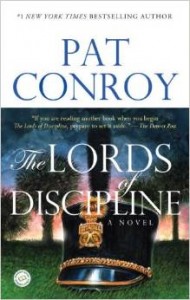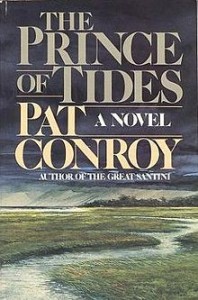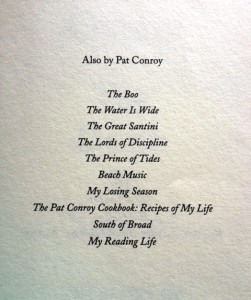When I was in high school, I had a great English teacher. She was wonderful for many reasons, but one in particular still stands out to me was that she was so passionate about literature and wanted to spread that passion to all the students in her class. I remember the introductions to books I’d never heard of, and many more that I didn’t want to read, but after each presentation we could not help but be affected by that contagious passion. There was something valuable in each book, and it was our duty, no, our pleasure to seek it out.
 Besides instilling passion into the young, malleable mind of an adolescent, another primary role of a teacher is to gain the trust of a student. The student inevitably asks “Will I ever use this?” or “What is this for?” and generally they receive the same pat answer, “Just trust me.” The teachers who are able to lead students from that lazy response to a real and exciting understanding of trust that is won over and are truly the great ones.
Besides instilling passion into the young, malleable mind of an adolescent, another primary role of a teacher is to gain the trust of a student. The student inevitably asks “Will I ever use this?” or “What is this for?” and generally they receive the same pat answer, “Just trust me.” The teachers who are able to lead students from that lazy response to a real and exciting understanding of trust that is won over and are truly the great ones.
Like many students, I saw my summer reading list for English and gasped with despair. Not just the quantity of books on the list, but the appearance of so many dreaded titles: “As I Lay Dying” by William Faulkner, ” “The Grapes of Wrath.” by John Steinbeck and “Pride and Prejudice.” by Jane Austen. We all were familiar with them, and besides not wanting to spoil the freedom of our summer bliss, we really didn’t want to commit ourselves to the drudgery of wading through complicated prose. I had loads of other great books I wanted to read, and I had no expectations of letting the reading list mandate my literary consumption.
To my surprise, I read all of them. Not just skim over them, but really read them. At the time, I just did it. I don’t know if I was trying to be a good son or a student, but I was curious why she put the books on there and why she encouraged us to find some great thing in each book. I think what she alluded to is that if we searched for greatness we would be pleasantly surprised.
Now, some of that curiosity diminished over the course of each book because there were quite a few occasions where I was fumbling through some dense chapters, i.e. the stream of consciousness of the members a southern family, and simply gave up at the moment. Part of me still doesn’t understand why it’s as popular as it was. That’s ok though, because by and large I am a better person for finishing that summer reading list and completing “As I Lay Dying.”
Later on that year, to my delight, there was a wildcard choice on that reading list, “The Lords of Discipline” by Pat Conroy. Now, here was a book I could actually enjoy. It was about real things in life. Real boys doing real things in a real place. Growing up and fighting through a rite of passage when it wasn’t easy and the environment didn’t support you.
I understood that and felt myself identifying with Will McClean as he faced his first year as a “plebe” at the fictional Carolina Military Institute. To me, that felt like my freshman year at my high school. Luckily for me, I didn’t have to experience the same excruciating physical trials Will had to go through, although my basketball practices verged on a lighter form of this kind of punishment, and a greater differentiator in my case, we had girls at my high school. (But it’s not like I talked to them anyway.)
If there’s one thing I can say about “Lords of Discipline” is that it grabbed me. Early on in the book, those overpowering military arms grabbed my shirt with both hands and pulled me face first into that “Lesesne Gate” onto campus. Before I knew what was happening, I tried to regain my balance, but received a swift kick in the rear which sent me flailing into into that pristinely manicured green. I could taste the bitter grass in my teeth and when I regained my senses I looked up to appreciate the blinding white facades of grand military buildings from the fictionalized institution. From this vantage point, I was truly a lowly first year.
I had forgotten that a book could really throw you around and make you lose a sense of self and orientation to the real world in which you inhabited. This one made my knees bleed from repeated falls from exhaustion and blisters sprouted under the balls of my feet from miles of marching in standard military issue boots. I remember feeling like my body ached after reading the detailed regimen of daily punishment, er “training exercises,” and feeling the injustice of deliberate sleep deprivation. All of those real bodily symptoms affected me and I had to train my body to this new physical demand, and with Will I eventually did.
Almost naturally, Will’s comrades, Mark, Pig (Pignetti), and Tradd, his brothers in the fight, became my friends. I knew their backgrounds, their motivations and desires, and their northern and southern accents sounded in my ears when they spoke. I wanted to know not just what was happening to Will, but what was going to happen to them too. How were they going to make it out of the first year, or graduate, would they survive the trial by fire? I really did care, like they were my own friends. I was linked, and I couldn’t unlink myself from the pages.
So when Pig unexpectedly dies, Conroy’s writing, which had taken me on a journey I didn’t think was possible did something even more unimaginable. From deep inside myself, like as if I was receiving the news of a close friend, my body naturally reacted, and I shed a few tears. I remember stopping myself in the middle of that page and thinking out loud, “Did a book just make me cry? How can a book do that?”
Maybe you’ve had that strange, somewhat humiliating, experience before, and maybe you haven’t, but before you start to judge, I think it’s only fair to ask you to read the book yourself and see how you handle the death of a friend. If you’re like me, when that book grabbed me, put its arm around my shoulders, punched me in the side, or offered a hand to pull me up out of the dirt, I felt it all.
“How can a book do that?” Again I questioned myself.
——
I haven’t ever made a personal reading list, nor have I ever finished a reading list since my last English class in high school. It just didn’t seem worth it over the years, and I excused myself from such a duty, because I never had the time to carry it through. But now, I have a reading list. About 15 years have passed since that one that contained “The Lords of Discipline,” and as we all can attest to: life has a way of coming back around to remind us of the important things.
A couple of years ago, I was getting on a plane. I had music stocked up on my iPod, some photography magazines, and given the current lack of sleep I was managing, I doubted that I’d get to either of those two activities. Somewhere after the first nap of the flight I made my way back to the bathrooms. It was a clear afternoon and the sun was shining in through the windows, and there was a 30-something man with long hair reading a book I recognized. He was sitting in the middle seat on the last row of the airplane, and as you know, that’s probably the worst place you can be placed, given the uncomfortable nature of fighting for armrests between two strangers and having the discomfort of being the second to last person to get off the plane.
For some reason, it seemed like that didn’t matter to him. He didn’t seem to mind. He was completely enraptured by a book. What was he reading anyway?
“The Lords of Discipline.”
I recognized the title, but didn’t recognize the author. “Hmmm, Pat Conroy. I guess that’s his name.”
When I got back to my seat I made a note about his name so that I could look up what other titles he had written. Oddly, I had a new, but familiar sensation, I wanted to see what that book, that book I had read contained that made such an impact on me in high school. Or more precisely, why did that book so engage me 15 years ago, and why was a man almost 10 years my senior so captivated by it. How could a book make fans out of people who were in completely different life stages. There had to be something in that writing that was worth exploring.
So when I finally got back to the Internet, I went to Amazon, and it seemed like I opened a drawer and a bunch of valuable things that were meant to be mine tumbled out before me. Here were a number of titles by Pat Conroy, and nearly all of them were accompanied by hundreds and hundreds of reviews by men and women, old and young, giving praise to this Souther writer. It’s like I had stumbled on something I should have been looking for a few years ago.
Luckily for me, I could acquire nearly all of these titles for just a few dollars each with shipping. So if I really wanted to explore again what it was that grabbed me initially, I could do so with a minimal investment. Can’t really say no to that decision. A week or so later these books came in from various thrift stores from around the east coast or midwest. I’m not sure why I ordered five titles, when the last book I read by the author was just a dimly lit pleasant memory about  15 years ago. Maybe that was just the economy of the decision, huge upside with very little downside.
15 years ago. Maybe that was just the economy of the decision, huge upside with very little downside.
So with that pile of books on the kitchen table, I read each of the back covers and decided to go for “Prince of Tides.” I feel silly admitting that it probably had more to do with the cover art than with the description.
And before I knew what was happening, it happened again. Two hands grabbed me, and pulled me forward, off my chair and onto the shores of Colleton county in South Carolina. Up until this point I was comfortable with books around the 200 page range. One’s that I took a leisurely month or two to finish, and never offered more than a pat on the back or slight nudge from the elbow. Somehow I was manhandled through 576 pages in about two weeks. The writing was real, and bold. It was tough and pushed me around and let me drift softly back into the Atlantic waters at sunset. It was interesting, it was deep, it made me question, and quietly it held my attention in a mostly interruptive world. Most importantly, it held nothing back. That was what I was looking for in life, something that went beyond the facades and presupposing nature of expected behavior and results. In reading this fiction, I felt like I was rediscovering my own reality.
I was hooked. Somewhere in the third book, I flipped back to the front of the book where they list the infamous “Also by” list, I decided that I would read every book Pat Conroy wrote, which is not easy considering that one is out of print, and some are 500-700 pages. But I wanted to know one simple question, one that has stayed with me since that day Pignetti died in “The Lords of Discipline”:
“How can a book do that?”
So, now I’ve got a plan, quite simple in structure, but demanding in effort: every book on the list.

 was made into a movie “Blind Side” with Sandra Bullock about Michael Oher, an offensive lineman, a left tackle (who protects the blind side of the quarterback) who plays for the Tennessee Titans of the NFL. Great movie, and a pretty good script too. (Which wasn’t written by Michael Lewis, but anyway).
was made into a movie “Blind Side” with Sandra Bullock about Michael Oher, an offensive lineman, a left tackle (who protects the blind side of the quarterback) who plays for the Tennessee Titans of the NFL. Great movie, and a pretty good script too. (Which wasn’t written by Michael Lewis, but anyway). propelled him into his writing career was “Liar’s Poker,” the 1989 non-fiction, semi-autobiographical book about a younger Michael Lewis, age 26, as a a bond salesman for Salomon Brothers, the infamous Wall Street broker during the crazy financial period of the 80’s. (I have since finished this book, and enjoyed it thoroughly. It helps to lay the ground for understanding where Michael Lewis came from.)
propelled him into his writing career was “Liar’s Poker,” the 1989 non-fiction, semi-autobiographical book about a younger Michael Lewis, age 26, as a a bond salesman for Salomon Brothers, the infamous Wall Street broker during the crazy financial period of the 80’s. (I have since finished this book, and enjoyed it thoroughly. It helps to lay the ground for understanding where Michael Lewis came from.)